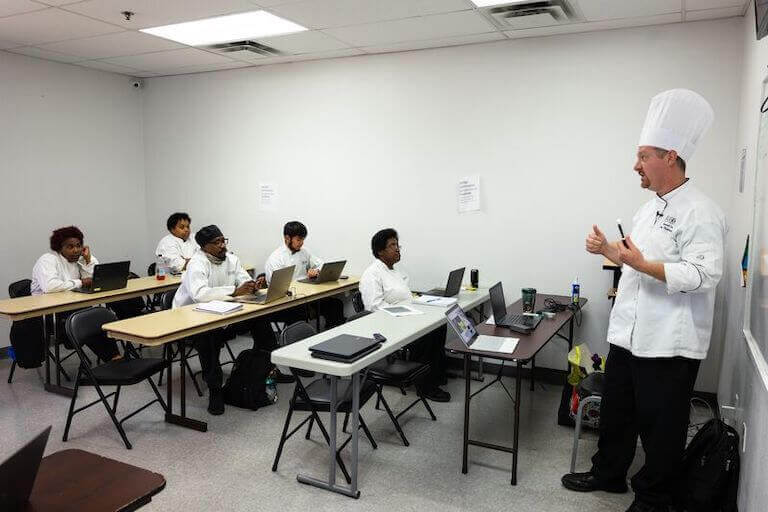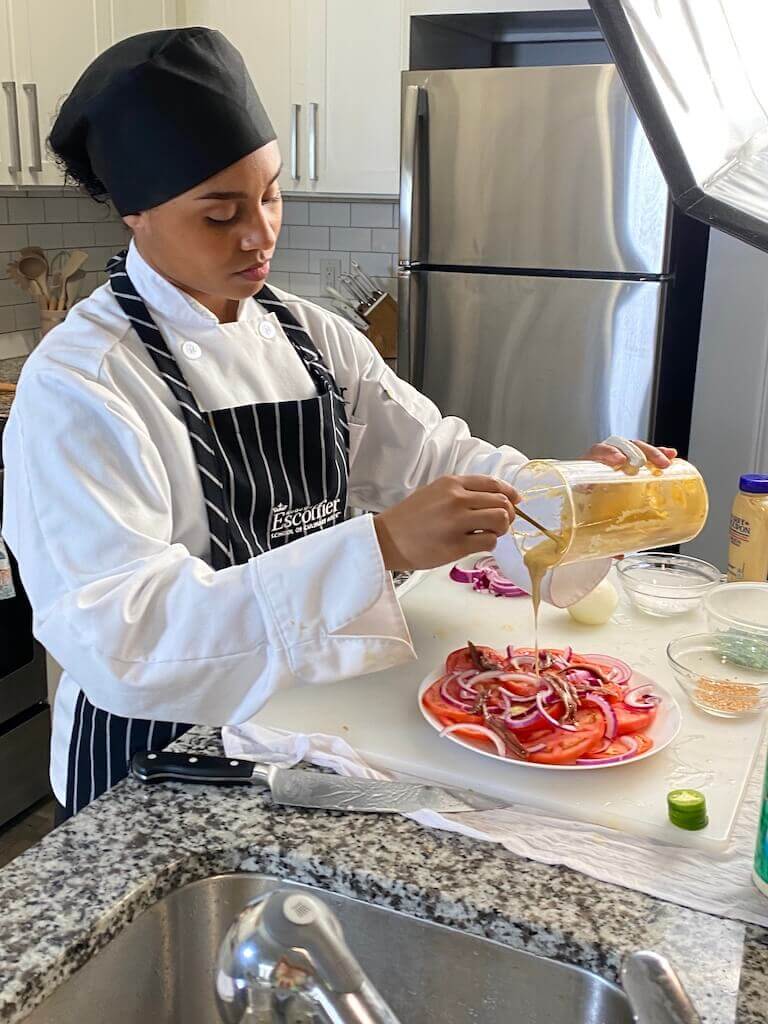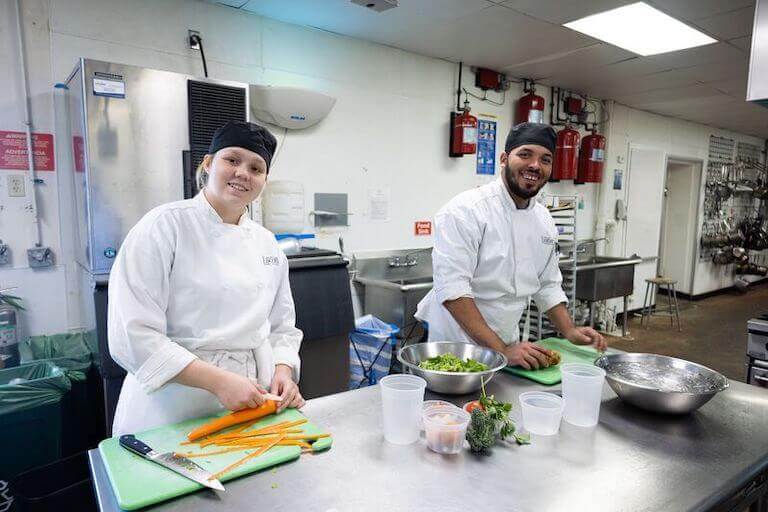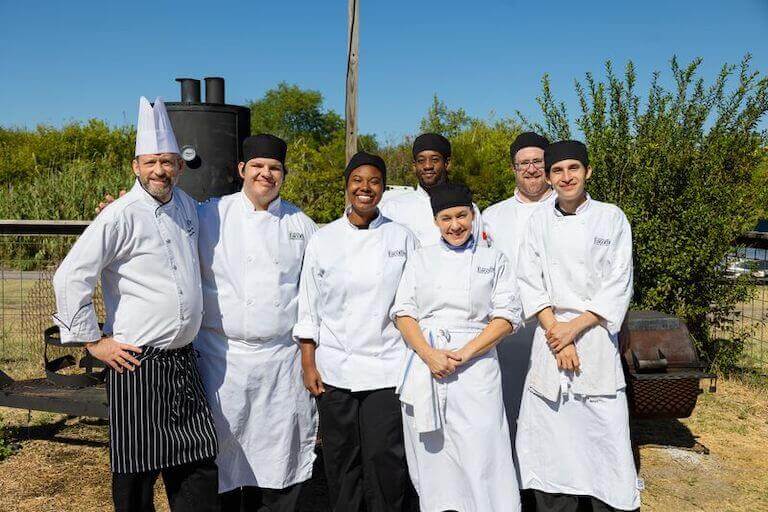When you imagine attending cooking school, what do you see? A stuffy French chef with a 10-foot tall hat shouting at the students and throwing cookware? Or perhaps a curriculum that has students in the kitchen 100% of the time—leaving them with no clue how to build or price a menu?
Fortunately, neither of these scenarios reflects reality—at least not at Auguste Escoffier School of Culinary Arts.
Here’s what you can expect when you attend cooking school at Escoffier.
Specific Programs to Help You Get Closer to Your Goals
Just as a university student will select a major, a cooking school student will choose a specific program that focuses on a particular area of the food industry.
At Escoffier, students may choose from the following disciplines:
- Culinary Arts: combining classic French cooking, contemporary techniques, and relevant foodservice business coursework
- Baking & Pastry Arts: the foundations of breads, pastries, and other desserts, plus business education like cost control and menu design
- Food Entrepreneurship: a business education exploring marketing, business planning, and leadership with a foodservice angle
- Plant-Based Culinary Arts: exploring sustainability and substitutions for delicious plant-based cooking
- Holistic Nutrition & Wellness: combining the concepts of nutrition and wellness with the foundations of cooking healthy meals
- Hospitality & Restaurant Operations Management: business-focused coursework to develop hospitality industry expertise, leadership skills, and analytical reasoning
Each of these programs has been carefully designed to lay the groundwork students may need to establish careers in their chosen fields, whether that’s becoming a cook or chef, running a bakery, starting a food truck, or managing a hotel.
By attending a dedicated culinary school, students can feel confident that each course is specifically geared toward the food industry. Even courses in foodservice accounting and business writing are approached from a culinary perspective!

Both the classroom and cooking portions of culinary school all relate back to foodservice.
The Flexibility of an On-Campus or Online Education
You may think that cooking school requires students to attend classes in person. While this was true once upon a time, it’s no longer the case.
Escoffier does offer programs in both Austin, Texas and Boulder, Colorado for those who prefer an on-campus experience. But students have the added option of attending culinary school online as well.
Each week in online culinary school follows a similar pattern. It begins with assigned reading and video content to familiarize students with the material. Then, students attend live virtual classes with professional Chef Instructors. These sessions may include demonstrations and the chance for students to ask questions.
Next, students complete cooking assignments from their own kitchens. They take photos of their progress along the way and prepare a written summary. The purpose of the summary is to explain the process and assess the taste and texture of the dish.
Chef Instructors will review the photos and summary, and provide personalized video feedback to each student. This may include corrections and suggestions for improvement.
Online cooking school can give students the flexibility to get their education while continuing to work full-time or fulfill other obligations if necessary. And it takes the challenge of relocating for school out of the equation.

An online culinary arts student working on an assignment.
A Hands-On Curriculum
Exactly what you can learn in cooking school will vary based on your program choice, and whether you complete a degree or diploma program.
But you will be sure to find a hands-on curriculum that balances classroom work with “lab work,” aka cooking!
Each program at Escoffier has a different ratio of kitchen-to-classroom hours. But each cooking-focused program (culinary arts, pastry arts, and plant-based culinary arts) includes at least 380 clock hours of kitchen time, giving students plenty of practice.
While there is a great deal of theory and knowledge to absorb, cooking school should also provide ample opportunity to put theory into practice and build muscle memory. Expect to chop, mix, cook, and plate!

The kitchen lab work is an important part of cooking school.
Education from Expert Chef Instructors
A cooking school is only as good as its Chef Instructors. The old adage “those who can’t do, teach” does not apply. Escoffier’s Chef Instructors have done it all, and they have the resumes to prove it. Some are Certified Executive Chefs®, and some have started their own restaurants or bakeries. They have cooked for the rich and famous, and done food styling for film and television. Many have worked in Michelin-starred restaurants or written their own cookbooks.
“The chef instructors are all amazing–they have tutoring, and workshops and they answer all of your questions with so much dedication. I’ve learned so much. They encourage you and help you believe in yourself. You do need the dedication, commitment, and desire to work hard for your dreams but they will help you achieve them. Best decision I made in my life.”*
Elizabeth Atanacio, Escoffier Online Baking & Pastry Student
But in addition to being accomplished chefs, they’re also dedicated instructors. Teaching is a different skillset than cooking. And at Escoffier, each Chef Instructor is chosen not just for their cooking skill, but for their enthusiasm and passion for sharing what they know with their students.
Meet Some of Escoffier’s Chef Instructors
- Chef Instructor John Percarpio has cooked for Michelin-starred restaurant Palais Lenbach Otto Strasse 6, and he cooked for Julia Child’s 77th birthday dinner.
- Certified Working Pastry Chef® Karla Lomeli has a Master’s degree in education, and has worked at Michelin-starred restaurant Koldo Royo in Spain.
- Award-winning chef Joseph Celmer has cooked for professional athletes in Chicago, and was an Executive Chef for British Airways.
- Chef Instructor Julie Clark helped Chicago restaurant Band of Bohemia to receive its Michelin star. She also has been pastry chef for the largest catering company in Boulder, Colorado, and for private club Soho House & Co. in NYC.
An Entrepreneurship-Focused Education
We are living in the era of the entrepreneur. More and more people are planning a future that puts them in charge of their time and their business. To meet this growing demand, many of Escoffier’s programs each have an entrepreneurial slant, with coursework in topics like starting a business plan, marketing, and/or business ethics.
While the specifics vary from program to program, you can expect at least some discussion of the unique challenges and opportunities that come with the business of entrepreneurship.
(If you’re more interested in a foodservice business education than a cooking education, check out our new Food Entrepreneurship programs!)
An Industry Externship for Real-World Experience
The transition from school to work can be jarring. Some students find it difficult to translate what they’ve learned in school into real-world applications. The focus on speed, for example, can be a challenge when you’re used to doing your cooking work in a more relaxed environment, either at home or on-campus.
To help bridge this gap, every Escoffier student must complete at least one industry externship before they graduate. These real-life experiences can help students to make a smoother transition from school to work, putting what they’ve learned into practice. It can also be a resume builder for those who haven’t worked in a professional kitchen before.
Some students have even ended their externships with an offer for full-time employment.*
“The externship class allows students—even those with no prior experience—to get their foot in the door. Once they gain that valuable experience, it is easier for them to determine which path they want to take with their careers.”*
Maria Davenport, Escoffier Hospitality & Restaurant Operations Management Instructor
A Diverse Student Body
The flexibility of Escoffier’s online programs makes them a natural choice for the “non-traditional student.” This means that in addition to recent high-school graduates, Escoffier welcomes many older students, or career-changers, who may be attending post-secondary school for the first time, or embarking on a new career. In fact, 79% of Escoffier Boulder and online students were 25 or older as of fall 2022.
Escoffier also welcomes a wide range of student ethnicities. For instance, 32% of Boulder/online students identified as Black or African-American, 29% as White, and 10% as Hispanic/Latino in the fall of 2022..
With many ages, ethnicities, and cultures represented in Escoffier’s student body, it can be a place to learn from each other as well as from Chef Instructors.

Escoffier students come from all age groups and ethnicities.
A Supportive Team of Administrators and Faculty
Not all students begin school with the same support system. Fortunately, Escoffier offers a number of resources to help students who may need additional guidance.
Online students each have a Success Coach who works to help the student to achieve their goals at school. Success Coaches can provide valuable support to students who may be struggling. This could include overcoming personal challenges, accessing additional educational resources, and connecting students with other Escoffier staff members. At Escoffier’s Austin and Boulder campuses, there are also success coaches and students services representatives to help students keep students on track so they can get the most from their education.
Both before and after graduation, students can also get help from Career Services to improve their employment prospects. This could include resume writing help, interview preparation, and a job board. In some cases, Career Services may even be able to introduce students to hiring managers.
“I struggled with school in the past for years but with the help of Career Services and my Success Coaches, I graduated on time. I put a goal in place of getting 95% or higher in each of my baking courses and I did exactly that.”*
Kellie Trimble, Escoffier Online Pastry Arts Graduate
Do the Research to Make the Right Choice for Your Future
The investment of time, money, and effort into culinary school isn’t one to take lightly. So we commend you for doing the research before you commit!
To learn more about the realities of culinary school, our Admissions Department is available to answer your questions. You can also schedule a tour at our Austin or Boulder campuses, and chat with our Financial Aid Department to explore funding options.
To learn more about cooking school at Escoffier, read these articles next:
- 6 Benefits of Studying at a Top Culinary Institute
- A Day in the Life of an Online Culinary Student
- Escoffier 101: Everything You Need to Know About Culinary School
*This information may not reflect every student’s experience. Results and outcomes may be based on several factors such as geographical region or previous experience.

 “The externship class allows students—even those with no prior experience—to get their foot in the door. Once they gain that valuable experience, it is easier for them to determine which path they want to take with their careers.”*
“The externship class allows students—even those with no prior experience—to get their foot in the door. Once they gain that valuable experience, it is easier for them to determine which path they want to take with their careers.”*
